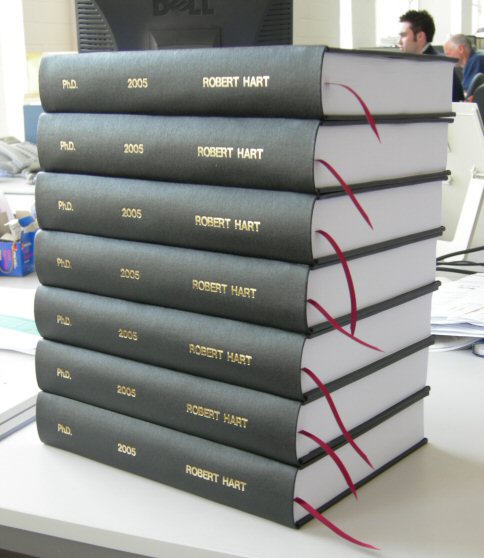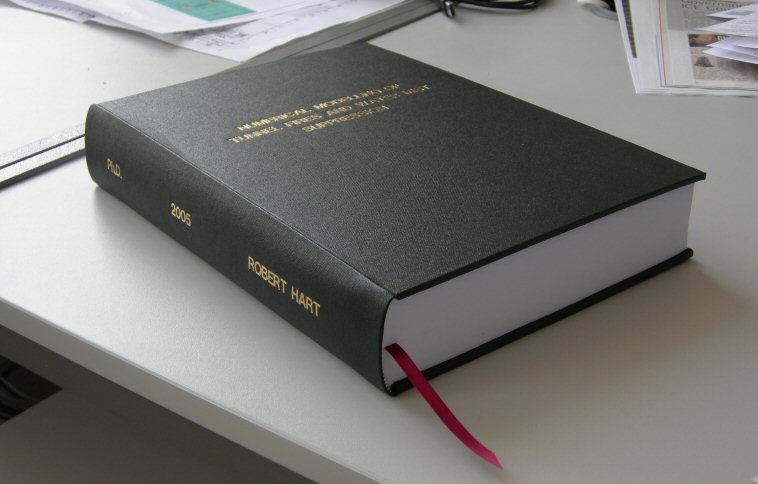PhD Archives
19 June 2006
It's only words
The answer is of course "Depends how you count them", but is something like 48,000. There are (very) approximately 4900 different words, meaning that on average each word comes up just under 10 times. (It's hard to count accurately count unique words because things like equations (and LaTeX markup) throw in a lot of junk that can't really be considered words).
In fact some words come up a lot more often than that:
3829: the 2149: of 1324: a 1274: and 1160: to 1038: is 866: in 595: for 453: fire 391: be 375: this 350: as 316: mist 306: with 306: model 304: are 295: by 292: was 281: that 255: onIn other words 25% of my thesis is made up of just eight words, and none of those words are specific to the topic!
The longest (unhyphenated word) is "indistinguishable" (17 letters) followed by "parameterisation" and "destratification" (16 letters). The median length is just 3.9 letters. The distribution of word length is:
1: 1885 2: 7926 3: 8518 4: 6740 5: 4453 6: 3488 7: 3384 8: 3170 9: 2221 10: 1827 11: 1304 12: 638 13: 311 14: 152 15: 40 16: 9 17: 1(equations boost the 1-letter count considerably)
09 June 2006
Looks like my work here is done

 After 4 years, 11 months and 7 days it's finally
complete (well almost - I still need to burn the CD to go in the
back cover). It's fantastic to see it all bound up with the title
"Numerical Modelling of Tunnel FIres and
Water Mist Suppression" emblazoned in gold across the cover.
After 4 years, 11 months and 7 days it's finally
complete (well almost - I still need to burn the CD to go in the
back cover). It's fantastic to see it all bound up with the title
"Numerical Modelling of Tunnel FIres and
Water Mist Suppression" emblazoned in gold across the cover.
For anybody interested here's a pdf (20MB).
20 January 2006
Finished!!
In all it took 1637 days, and contained 333 pages. I could give you more statistics, but I think you'd just label me as a nerd. Depending on whose version of time you consider, I was somewhere between 18 months late and 21 minutes early.
18 November 2005
Time...

04 November 2005
Drowning in data
The problem is that because there's a slight possibility that I may need to do further analysis on the data at some point in the future, and so I save all of that to disk every now and again (every 25s of simulation time, or 18 hours of real time, for up to four cases running simultaneously)
Net results: over 1 Gb a day being added to hard drives that are essentially "nearly full" almost all the time.
02 November 2005
Freecell ban
In case you are wondering, I managed 86% wins, with a longest winning streak of 20 games and longest losing streak of 2. Statistically, (again using my losely remembered A-level Maths) that means the 95% confidence interval for my success rate is 79% to 92% (also it's more likely that I'm worse than 86% than better than it)
17 October 2005
Milestones
My SVN archive of the thesis document is now at revision 219, which equates to roughly one commit per day since I started using it.
Also, for those pointing out how much time has passed compared to how much I have left to go, will be reassured to know that the 1568 days that have passed since I started my PhD are a mere 97% of the time I intend to spend on it.
07 September 2005
200 page landmark
There's now very little left unwritten (just things like the conclusions that you're meant to leave til the end) but lots of little bits that could do with some polish and plenty of proofreading.
Anyone care to guess the final page count? Sweapstake?

24 August 2005
Time Left
I hope that that is the end of the matter.
The bouncing around the screen business has been rejected on two grounds:
- It is aesthetically unacceptable
- I don't have a clue how to do it
- I have better things to do with my time
11 August 2005
The deadline looms
I just handed in my intent to submit form, which is the bit of paperwork the university needs in order to start going through all the red tape needed to find an external assessor (and in my case an internal assessor, as my original internal is now my supervisor).
Amongst other things, the form states that I intend to submit by the 18th November, which by my reckoning gives me 99 days to finally finish the damn thing off. In fact, I've just written the following script, which knowing me, I will be checking every ten minutes from now till then. In fact I'm tempted to set it as a prompt command....
99 days, 2 hours and 0 minutes#!/bin/sh handin=`date -d "18 November 2005 12:00" +%s` now=`date +%s` left=$(($handin - $now)) days=$(($left/(24*60*60))) hours=$(($left/(60*60)-24*$days)) minutes=$(($left/(60)-(24*$days+$hours)*60)) echo $days days, $hours hours and $minutes minutes
05 August 2005
Publications
You have two publications to your name in fact:-
- Rigid block distinct element modelling of dry-stone retaining walls in plane strain, with M. Claxton, R. Hart & P.McCombie, in ASCE Journal of Geotechnical and Geoenvironmental Engineering, 131, 3, pp 381-389, 2005.
- Distinct Element Modelling of Masonry Retaining Walls, with R.Hart and M.Claxton, in Proceedings 6th Australasian Masonry Conference, 185-194, Adelaide, Australia, July 2001
The second paper I knew about, but the first (in a real journal!!!) was a big surprise to me. What's more, after I managed to get a copy from the e-journals service, I realised that it really is a lot of my work.
Time to go update my CV :)
28 May 2005
Extension trouble
Received a letter from the University dated 17th May, informing me that if I don't plan on submitting before 30th June, I need to apply for an extension 6 months in advance. Trouble is, this is all based on my original start date + 4 years, and fails to take into account the 6 month extension I was previously granted.
Looks like somebody couldn't be bothered with all the hassle the first time around and took shortcuts, so now I have to formally apply for an extension. It seems so futile having to chase your own institution to get permission to do something you are doing for their benefit as much as your own.
